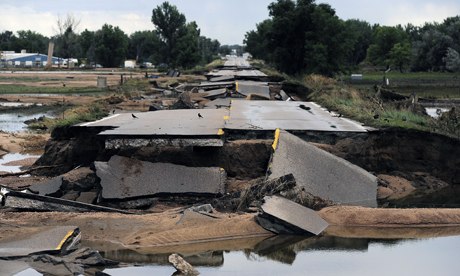Make the rich change their ways to avoid a 2C rise, says top scientist
-
John Vidal in Warsaw
- theguardian.com, Friday 22 November 2013 03.45 AEST
- Jump to comments (100)

One of the world’s leading climate scientists has outlined a radical plan to hold temperatures to a 2C rise, the threshold that governments have agreed to limit rises to – but he accepts it may cause consternation among the very rich.
Kevin Anderson, professor of energy and climate change at the University of Manchester and deputy head of the Tyndall Centre, has argued previously that industrialised countries may need to go into recession to reduce emissions enough to ensure temperatures do not rise over 2C.
But as a 4C rise, which is looking increasingly realistic, would be “catastrophic” and must be avoided at all costs, he now says that political and personal efforts should be concentrated on changing the consumption patterns of the very few who emit the most – and that includes most of the people at the climate talks currently underway in Warsaw.
“We think it is still possible to avoid 2C rise. It’s feasible, but only just. We think that there are economic but not financial benefits,” he told a side meeting at the UN talks.
“Annex 1 [industrialised] countries need a 70% reduction in emissions consumption in 10 years to give us an outside chance of holding temperatures to a 2C rise. They need to cut emissions by 10% annually. We need to be fully de-carbonised in the 2020-30s, and that means planes, fridges, everything [must emit far less] to give a bit of an opportunity for poorer parts of the world to develop.
“If we had started in the 1992 it might have been different. But now it needs a complete shift in mindsets,” he said.
Anderson argues that governments have become obsessed by growth but should abandon this and concentrate on the things that matter to people like health and food and shelter. “We have to think differently, look at the things that matter and make them better.
“The financial world has failed completely to cut emissions. The self-regulated market hasn’t regulated. We’re awash with capital [but] finance has failed in its own backyard. It cannot deliver the cuts needed. Carbon pricing will not work because it cannot drive prices fast enough.”
The problem is consumption, not supply, he says. “Only a very small percentage of people is responsible for most of the emissions. It’s about the few not the many. Mitigation to 2C is a consumption issue. There are things you can do on the demand side, [yet] we spend all our efforts on the supply side.
“It’s not about 2030, 2040 or later. It’s about what we can do now. How many people really need to reduce emissions? The Pareto’s 80:20 rule [a principle named after the economist Vilfredo Pareto] implies that 80% of emissions come from 20% of the global population. That means that 50% of emissions come from 1% per cent of the population.” This 1%, says Anderson, includes climate scientists and nearly everyone at the UN talks and just about all the rich.
The same 80:20 rule applies to technology, too, he suggests. “An A-rated fridge uses over 80% more than a an AAA-rated machine. The best available [of everything] is usually far, far better than what we usually buy.
“On average cars emit around 150gm of CO2 per kilometre. But the best, already available, are 85-110. If you put in a standard of 85g/km by 2015 and tightened it by 10% a year you would get a 40-50% reduction [in transport emissions] in just 10 years.
“We cannot rely on technologies like nuclear or wind power to reduce emissions in years to come. We start now. We must escape the shackles of the 20th-century mindset.”
